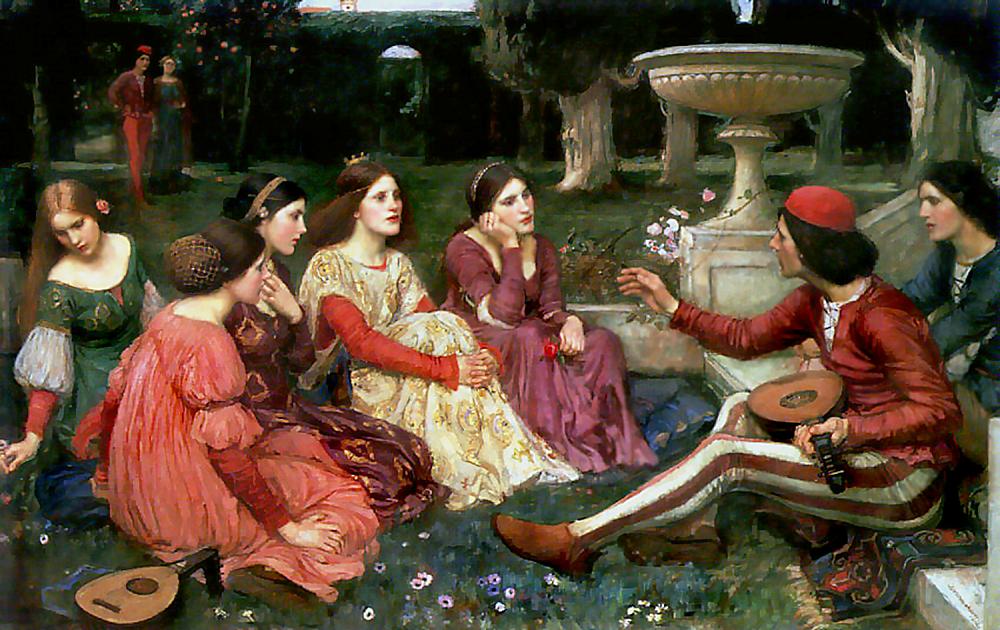
Tuesday
Washington Post humorist Alexandra Petri yesterday tweeted out the following message about coronavirus in the news, leading to today’s post:
I’ve had enough of this news! time to read some escapist literature, maybe a classic I’ve been putting off for a long time now to take a big sip of coffee and open this copy of the Decameron
Decameron (1353) is about a group of young men and women who retreat to a rural villa to escape from the Black Plague, which in 1347-51 wiped out a third of Europe’s population. To while away the time, they tell ten stories a day for ten days before returning to Florence. Decameron was the major inspiration for Chaucer’s Canterbury Tales, which appeared at the end of the century.
The Black Plague, of course, was far, far worse than COVID-19, but there are similarities in how people respond. On the one hand, Boccaccio describes those who isolate themselves entirely from the rest of society:
Some there were who conceived that to live moderately and keep oneself from all excess was the best defense against such a danger; wherefore, making up their company, they lived removed from every other and shut themselves up in those houses where none had been sick and where living was best; and there, using very temperately of the most delicate viands and the finest wines and eschewing all incontinence, they abode with music and such other diversions as they might have, never suffering themselves to speak with any nor choosing to hear any news from without of death or sick folk.
Of course, not everyone can afford this option, but the mentality describes those who withdraw in panic.
Then there are those who go about convincing themselves that all is well:
Others…carouse and make merry and go about singing and frolicking and satisfy the appetite in everything possible and laugh and scoff at whatsoever befell was a very certain remedy for such an ill. That which they said they put in practice as best they might, going about day and night, now to this tavern, now to that, drinking without stint or measure…
Boccaccio recommends “a middle course,” which involves using common sense but being careful:
Many others held a middle course between the two aforesaid, not straitening themselves so exactly in the matter of diet as the first neither allowing themselves such license in drinking and other debauchery as the second, but using things in sufficiency, according to their appetites; nor did they seclude themselves, but went about, carrying in their hands, some flowers, some odoriferous herbs and other some4 divers kinds of spiceries, which they set often to their noses, accounting it an excellent thing to fortify the brain with such odours, more by token that the air seemed all heavy and attainted with the stench of the dead bodies and that of the sick and of the remedies used.
To be sure, we no longer think that carrying flowers will work. (People used to think that the plague was conveyed through unpleasant smells.) But we can think of such a measure as the equivalent of washing our hands, not touching our faces, and avoiding large crowds.
One other detail from the introduction caught my eye as it suggests a reverse swine flu (a previous pandemic). If that one was passed from birds to humans through swine, Boccaccio describes an instance of swine infected by humans:
[N]ot only did it pass from man to man, but this, which is much more, it many times visibly did;—to wit, a thing which had pertained to a man sick or dead of the aforesaid sickness, being touched by an animal foreign to the human species, not only3 infected this latter with the plague, but in a very brief space of time killed it. Of this mine own eyes (as hath a little before been said) had one day, among others, experience on this wise; to wit, that the rags of a poor man, who had died of the plague, being cast out into the public way, two hogs came up to them and having first, after their wont, rooted amain among them with their snouts, took them in their mouths and tossed them about their jaws; then, in a little while, after turning round and round, they both, as if they had taken poison, fell down dead upon the rags with which they had in an ill hour intermeddled.
The young lords and ladies who retire to the villa model for us a healthy response: if the virus drives us into quarantine, we can use the found time to cultivate our minds and feed our souls. Picking up Decameron is not a bad option after all.
Previous posts on the coronavirus
Lady Macbeth: Hand Washing and the Coronavirus
Stephen King on How Pandemics Spread

